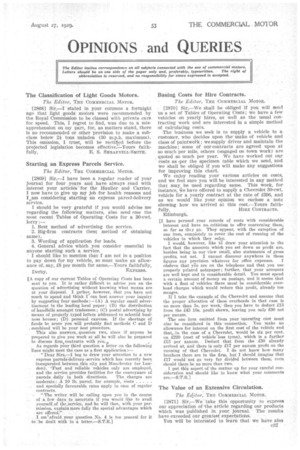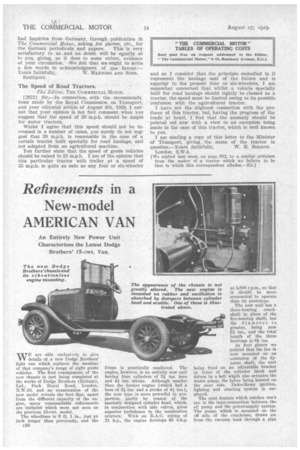OPINIONS and QUERIES The Editor invites correspondence on all subjects connected with the use of commercial motors.
Page 59

Page 60

If you've noticed an error in this article please click here to report it so we can fix it.
Letters should be on one side of the paper only and, preferably, typewritten. The right of abbreviation is reserved, and no responsibility for views expressed is accepted.
The Classification of Light Goods Motors.
The Editor, THE COMMERCIAL MOTOR.
[2868] Sir,—I stated in your columns a fortnight ago that light goods motors were recommended by the Royal Commission to be classed with private cars for speed. This, I regret to find, was due to a misapprehension on nay part, for, as matters stand, there is no recommended or other provision to make a subclass below 2i tons unladen (30 m.p.h. maximum). This omission, I trust, will be rectified before the projected legislation becomes effective.—Yours
E. S. SHRAPXELL-SMITH.
Starting an Express Parcels Service.
The Editor, THE COMMERCIAL MOTOR.
[2869] Sir,—.I have been a regular reader of your journal for four years and have always read with interest your articles for the Haulier. and Carrier. I now have to give up my job for health 'reasons and I.,am considering starting an express parcel-delivery service.
I should be very grateful if you would advise me regarding the following matters, also send sine the most recent Tables of Operating Costs for a 30-cwt. lorry :—
1. Best method of advertising the service.
2. Big-firm contracts (best method of obtaining same).
3. Wording of application for loads.
4. General advice which you consider essential to anyone starting such a service.
' I should like to mention that I am not in a position to pay down for my vehicle, so must make an allowance of, say, £8 per month for same.—Yours faithfully, EXPRESS.
Derby. •
[A copy of our current Tables of Operating Costs hag been sent to you. It. is rather difficult to advise you on the question of advertising without knowing what means are at your disposal. I gather, however, that you have not much to spend and think I' can best answer your inquiry by suggesting four methods :—(A) A regular small advertisement in the leading local paper ; (B) the distribution of handbills amongst tradesmen; (0) postal advertising by means of properly typed letters addressed to select&I business houses; (D) personal canvass. If the shortage of funds be acute you will probably find methods C and D . combined will be your best procedure.
This also answers. question two, since if anyone be prepared to give you work at all he will also be prepared to discuss firm. contracts with you.
As regards your third question a letter on the following lines might meet the case as a first application :— "Dear Sirs,—I beg to draw your attention to a new express parcels-delivery service which has recently been inaugurated between.this city and Manchester (or Lon don). and reliable vehicles only are employed, and the seivice provides facilities for the conveyance of parcels , daily in both directions. The charges are moderate: A 10 lb. parcel, for example, Costs and specially favourable rates apply in case of regular contracts.
" The writer, will be calling upon you in the course of a few days to ascertain if you would like to avail yourself of the,service, and he will then, with your permission, explain more fully the special advantages which are offered." , •
areafraid,your question No. 4 is ,too general for it to be dealt with in a letter...—s.T.R.] Basing Costs for Hire Contracts.
The Editor, THE COMMERCIAL MOTOR.
[2870] Sir,—We shall be obliged if you will send us a set of Tables of Operating Costs; we have a few vehicles on yearly hires, as well as the usual contracting work and are interested in a simple method of calculating costs. •
The business we seek is to supply a vehicle to a customer, who decides upon themake of vehicle and class of paintwoik ; we supply driver and maintain the machine; some of our contracts are agreed upon at so much per mile, others (engaged on town work) are quoted so much per year. We have worked out our costs as per the specimen table which we send, and we shall be obliged if you will make any suggestions for improving this chart.
We enjoy reading your various articles on costs, and we feel sure you will be interested in any, method that may be used regarding same. This week, for instance, we have offered to supply a Chevrolet 30-cwt. vehicle fin* a yearly contract at the rate of £396, and as we would like your opinion we enclose a note showing how we arrived at this cost. —Yours faith fully, HIRE CONTRACTS. Edinburgh.
[I have perused your records of costs with considerable interest and have no criticism to offer concerning them, so far as tiny go. They appear, with the exception of one item, completely to cover the cost of running of the vehicles to which they refer.
I would, however, like to draw your attention to the fact that the amounts which you set down as profit are, besides being in our view small, also statements of gross profits, not net. I cannot discover anywhere in these figures any provision whittever for office expenses.
obSErve that you are on the telephone and that you use properly printed notepaper ; further, that your accounts are well kept and in considerable detail. You must spend a certain amount of money on postage, and it seems that with a fleet of vehicles there must be considerable overhead charges which would reduce this profit, already too meagre.
If I take the example of the Chevrolet and assume that the proper allocation of these overheads in that case is no more than 5s. per week, then you have to deduct £13 from the £43 10s. profit shown, leaving you only £30 net per annum.
The one item omitted from your -operating cest must also be considered in this connection. You make no allowance for interest on the first cost of the vehicle and that,.in the case of a Chevrolet, would be six per cent. on /220 (cost of vehicle less tyres), which is a further £13 per annum. Deduct that from the 130 already arrived at, and there is only £17 per annum. profit on the running of that Chevrolet. I do not know how many brothers there are in the firm, but I should imagine that £17 would not go very far divided between them; even
should there be no more than two. •
I put this aspect of the matter up for your careful consideration and should like to know what your comments are.—S.T.R.] The Value of an Extensive Circulation.
The 1-)4itor, THE COMMERCIAL MOTOR.
12871] Sir,—We 'take this opportunity to express our appreciation of Jthe article.regarding our products which was published in your journal. The results have exceeded our greatest expectations. ,
You will be interested to learn-that we have also had inquiries from Germany, through publication in The . Com7rtercial Motor, asking for. photos, etc.,. for the German periodicals and papers. This is very satisfactory to us and. no doubt will be equally so to you, giving, as it does to some extent, evidence of your circulation. -We felt that we ought to write a few words in acknowledgment of thefavour.—
Yours faithfully, W. MANNING AND SONS. Southport.
The Speed of Road Tractors.
• TheEditor, THE COMMERCIAL MOTOR.
[2872] Sir,—In connection: with the recoramerida. tions made by the Royal Commission on Transport, and your editorial article of August 6th, 1029, I sub mit that your opinion is not fair comment when you suggest that the speed of 20 m.p.h. should be ample for motor tractors.
Whilst I .agree that this speed should not be increased in a number of cases,. you surely do not suggest that 20 m.p.h. is reasonable in the case of a certain tractor built specially for road haulage, and Dot adapted from an agricultural machine.
You further state that the speed of goods vehicles should be raised to 25 m.p.h. I am of the opinion that this particular tractor with trailer at a speed of 25 m.p.h. is quite as safe as any four or six-wheeler and as I consider that the principle embodied in it represents the haulage unit of the future and is superior to the present four or six-wheelers, I am somewhat concerned that whilst a vehicle specially built for road haulage should rightly be classed as a tractor, the speed must be limited owing to its possible confusion with the agricultural tractor.
I have not the slightest connection with the producer of this tractor, but, having the progress of the trade at heart, I feel that the anomaly should be pointed out now with a view to an exception being made in the case of this tractor, which is well known to you.
I am sending a copy of this letter to the Minister of Transport, giving, the name of the tractor in question.—Yours faithfully, W. E. BotToN. London, S.W.4.
[We replied last week, on page 912, to a similar criticism from the maker of a tractor which we believe to be that to which this correspondent alludes.—En.]












































































































